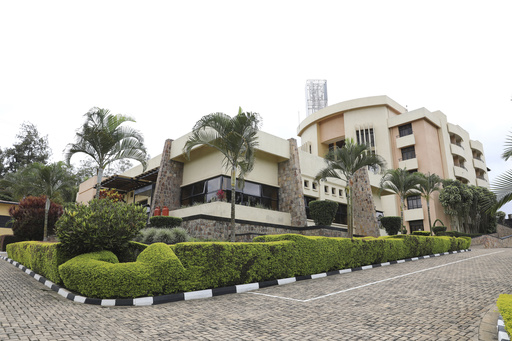KIGALI, Rwanda (AP) — Rwanda says it’s ready to receive migrants from the United Kingdom after British Parliament this week approved a long-stalled and controversial bill seeking to stem the tide of people crossing the English Channel in small boats by deporting some of them to the East African country.
There is even a place ready and waiting for the migrants — a refurbished Hope Hostel in the vibrant upscale neighborhood of Kagugu, an area of the Rwandan capital of Kigali that is home to many expats and several international schools.
The hostel once housed college students whose parents died in the 1994 genocide, this African nation’s most horrific period in history when an estimated 800,000 Tutsi were killed by extremist Hutu in massacres that lasted over 100 days.
British Prime Minister Rishi Sunak has pledged the deportation flights would begin in July but has refused to provide details or say about how many people would be deported.
Rwanda government’s deputy spokesperson Alain Mukuralinda told The Associated Press on Tuesday that authorities here have been planning for the migrants’ arrival for two years.
“Even if they arrive now or tomorrow, all arrangements are in place,” he said.
The plan was long held up in British courts and by opposition from human rights activists who say it is illegal and inhumane. It envisages deporting to Rwanda some of those who enter the U.K. illegally and migrant advocates have vowed to continue to fight against the plan.
The measure is also meant to be a deterrent to migrants who risk their lives in leaky, inflatable boats in hopes that they will be able to claim asylum once they reach Britain. The U.K. also signed a new treaty with Rwanda to beef up protections for migrants, and adopted new legislation declaring Rwanda to be a safe country.
“The Rwanda critics and the U.K. judges who earlier said Rwanda is not a safe country have been proven wrong,” Mukuralinda said. “Rwanda is safe.”
The management at the four-story Hope Hostel says the facility is ready and can accommodate 100 people at full capacity. The government says it will serve as a transit center and that more accommodations would be made available as needed.
Thousands of migrants arrive in Britain every year.
After they arrive from Britain, the migrants will be shown to their rooms to rest, after which they will be offered food and given some orientation points about Kigali and Rwanda, said hostel manager Ismael Bakina.
Tents will be set up within the hostel’s compound for processing their documentation and for various briefings. The site is equipped with security cameras, visible across the compound.
Within the compound are also entertainment places, a mini-soccer field, a basketball and a volleyball court as well as a red-carpeted prayer room. For those who want to light up, “there is even a smoking room,” Bakina explained.
Meals will be prepared in the hostel’s main kitchen but provisions are also being made for those who want to prepare their own meals, he said. The migrants will be free to walk outside the hostel and even visit the nearby Kigali city center.
“We will have different translators, according to (their) languages,” Bakina added, saying they include English and Arabic.
The government has said the migrants will have their papers processed within the first three months. Those who want to remain in Rwanda will be allowed to do so while authorities will also assist those who wish to return to their home countries.
While in Rwanda, migrants who obtain legal status — presumably for Britain — will also be processed, authorities have said, though it’s unclear what that means exactly.
For those who choose to stay, Mukurilinda said Rwanda’s government will bear full financial and other responsibilities for five years, after which they will be considered integrated into the society.
At that point, they can start managing on their own.
___
Follow AP’s global migration coverage at: https://apnews.com/hub/migration
This website uses cookies so that we can provide you with the best user experience possible. Cookie information is stored in your browser and performs functions such as recognising you when you return to our website and helping our team to understand which sections of the website you find most interesting and useful.
